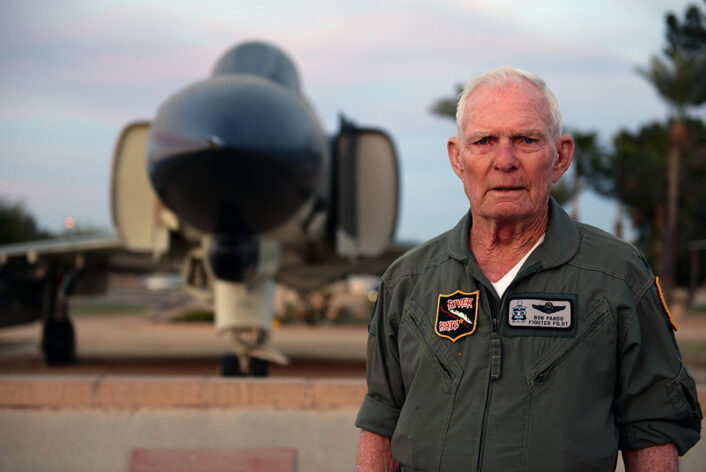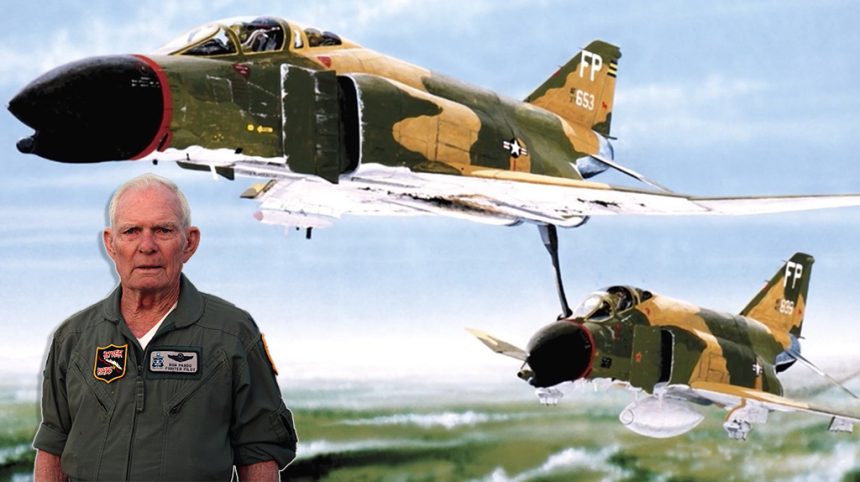Bob Pardo passed away earlier this month at the age of 89. With his Phantom, he pushed a crippled F-4 outside the enemy airspace in one of the most heroic missions in the history of military aviation, known as “Pardo’s Push”.
“Pardo’s Push” is the name of an incredible maneuver carried out during the Air War over North Vietnam that, over the years, has become the symbol of heroism and a demonstration of courage and contempt for danger.
March 10, 1967.
Captain Bob Pardo is flying in an F-4C with Weapon Systems Officer 1st Lt Steve Wayne. Their wingman is the F-4C flown by Captain Earl Aman with Weapon Systems Officer 1st Lt Robert Houghton. The two Phantoms of the 8th Tactical Fighter Wing, based at Ubon Royal Thai Air Force Base, Thailand, are assigned the task to attack a steel mill in North Vietnam north of the capital Hanoi.
During the approach to the target, both F-4 is hit multiple times by enemy’s anti-aircraft fire. The North Vietnamese flak causes significant damage to Capt. Aman’s aircraft whose fuel tank begins to leak fuel forcing the crew to abort the mission. While hit too, Pardo’s F-4 is able to continue its mission.
On their egress route, at 20,000 feet, Aman and Houghton determine that they do not have enough fuel to reach a tanker or Laos, where they could eject and avoid capture. Although his F-4 is still efficient and has enough fuel to reach a tanker, Pardo decides to remain with his wingman.
At a certain point, while still inside North Vietnamese airspace, Aman’s Phantom flames out. To save Aman and Houghton, Pardo decides to do something he believes no one has ever done before: he attempts to push the other F-4 to Laos.
Initially, Pardo tries to push the other F-4 by gently making contact with the drag chute compartment. However, turbulence interferes with the maneuver and after several failed attempts, Pardo opts for an extreme solution: he instructs Aman to lower his tailhook, then he positions his F-4 behind the other Phantom leaning his windscreen against the tailhook. The contact is made but the “solution” is quite unstable and, as a consequence of turbulence, Pardo needs to reposition his F-4 every 15 to 30 seconds. Nevertheless, the push works and rate of descent of Aman’s Phantom is considerably reduced.
As if the situation was not complicate enough, Pardo’s F-4 suffers an engine fire, forcing him to shut it down.
Try for a second to visualize the situation: a flame-out F-4 is somehow pushed by means of its tailhook by another F-4 powered by a single engine. In enemy airspace. Incredible.
Pardo pushes Aman’s F-4 for another 10 minutes until his Phantom runs out of fuel too. With both planes safely inside Laotian airspace, at an altitude of about 6,000 feet, the aircrews of both F-4s ejects (they will be rescued by SAR helicopters and evade capture).
Although he saved another aircrew, Pardo was initially reprimanded for not saving his own F-4. Until 1989, when the episode was re-examinated and both Pardo and Wayne were awarded the Silver Star.

Pardo and Aman both continued serving and retired from the U.S. Air Force in the rank of lieutenant colonel. Years later, after learning that Aman had lost his voice and mobility because of Lou Gehrig’s disease, created the Earl Aman Foundation that raised enough money to buy Aman a voice synthesizer, a motorized wheelchair, and a computer. The foundation later contributed to raise funds to pay for a van, which Aman used for transportation until his death. In other words, Pardo never left his wingman behind, not even after retiring.
Noteworthy, as told by John L. Frisbee in his 1996 article for Air Force Magazine, Pardo’s push was not the first time a U.S. pilot pushed another jet out of enemy airspace: in 1952, during the Korean War, fighter ace Robbie Risner pushed his wingman out of North Korea in an F-86. However, pilots were ordered to refrain from attempting the hazardous maneuver again, and the episode had faded from memory and was almost completely unknown within the Air Force by the time Pardo and Wayne pushed Aman and Houghton outside of North Vietnam’s airspace.
Bob Pardo passed away aged 89, on Dec. 5, 2023. His courage and ingenuity, along with the legendary “Pardo’s Push“, will be remembered forever.









